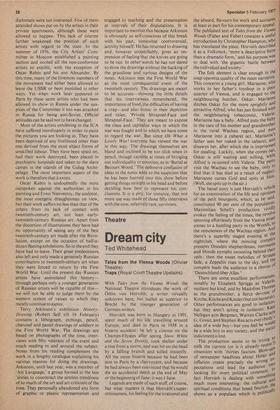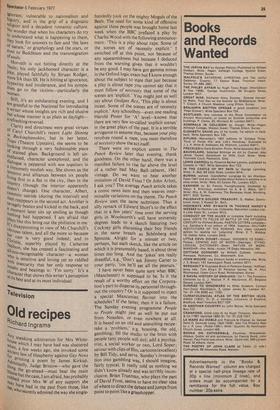Theatre
Dream city
Ted Whitehead
Tales from the Vienna Woods (Olivier Theatre) Traps (Royal Court Theatre Upstairs)
With Tales .fron the Vienna Woods the National Theatre introduces the work of odon von Horvath, a writer virtually unknown here, but hailed as superior to Brecht by the younger generation of German writers.
Horvath was born in Hungary in 1901, spent much of his life travelling around Europe, and died in Paris in 1938 in a bizarre accident : he left a cinema on the Champs-Elysées after seeing Snow White and the Seven Dwarfs, took shelter under a tree from a storm, and was hit on the head by a falling branch and killed instantly. All the more bizarre because he had been sent to Paris by a clairvoyant, and because he had always been convinced that he would die an accidental death at the end of May or the beginning ofJune: it was I June.
Legends are made of such stuff, of course, but what matters is that Horvath's superstitiousness, his feeling for the irrational and the absurd, flavours his work and accounts at least in part for his contemporary appeal The published text of Tales from the Vienna Woods (Faber and Faber) contains a useful introduction by Christopher Hampton, who has translated the piece. Horvath described it as a Vo/kstuck, 'more a descriptive form than a dramatic form,' and his purpose was to deal with 'the gigantic battle between the individual and society.'
The folk element is clear enough in the soap operetta quality of the main narrative. This concerns a young girl, Marianne, who works in her father's toyshop in a poor quarter of Vienna, and is engaged to the neighbouring butcher, Oskar. Marianne ditches Oskar for the more sprightly and attractive Alfred, who has just finished with the neighbouring tobacconist, Valerie. Marianne has a baby. Alfred puts the babY in the care of his mother and grandmother in the rural Wachau region, and Puts Marianne into a cabaret act. Marianne's father sees her naked in the cabaret, and disowns her, after which she is imprisoned for stealing. Luckily, when she comes out, Oskar is still waiting and willing, while Alfred is re-united with Valerie. The Part)/ visit the Wachau to see the baby, only to find that it has died as a result of neglect' Marianne curses God and spits at Hint (Well, she spits up in the air.) The banal story is just Horvath's vehicle for an examination of the life and oPinicirls of the petit bourgeois, which, as he said, constituted 90 per cent of the populati°,11, Maximilian Schell's production viviulY evokes the feeling of the times, the revolve spinning effortlessly from the Vienna street scenes to a bustling party in the Woods, t° the remoteness of the Wachau region. And there's a superbly staged evening at t,lie nightclub, where the mincing comPere presents Dresden shepherdesses, mermaids and blonde nymphs swooning behind their veils: then the sweet melodies of Strauss fade, a Zeppelin rises to the sky, and the compere leads the audience in a chorus ot 'Deutschland Ober Alles.' There are some excellent performances, notably by Elizabeth Spriggs as Valerie' resilient but kind, and by Madoline Thomas,. as the grandmother, a fierce devotee ot Kirche, Kiiche and Kinder( but not bastards)' Other performances are good in isolation. but they aren't acting in isolation. Kate Nelligan acts Bergman, Warren Clarke act,: G. Grosz, and Stephen Rea acts everybodyd idea of a wide boy—but you feel he W 11.1 I be a wide boy in any society, and the socia
indictment is lost, to
The production seems to be trying milk the current (or is it already recent '5' obsession with 'thirties fascism. Blow-uPd of newspaper headlines about Hitler all_ inflation create precisely the wrong 'to pectations and lead the audience tl„. looking for overt political comment..":, fact Horvath is dealing with somethin!, much more interesting: the cultural a.r1:-; spiritual conditions that breed fasci5rn. rt„ shows us a populace which is politicallY ignorant, vulnerable to nationalism and bigotry, and in the grip of a dogmatic religion and a decadent romantic culture. No wonder that when his characters do try to understand what is happening to them, they look for answers to fate and 'the laws of nature,' or graphology and the stars, or even to Buddhism and the transmigration of souls.
Horvath is not hitting directly at the Nazis; his only jackbooted character is a Joke, played faithfully by Struan Rodger, More SA than SS. He is hitting at ignorance, hypocrisy and intolerance, and his sympathies go to the victims—particularly the Women, Still, it's an exhilarating evening, and I am grateful to the National for introducing a writer whose insights are rich and elusive bkit whose manner is as plain as daylight— a refreshing reversal. Clarity and directness were great virtues of Caryl Churchill's recent Light Shining in Buckinghamshire, but in her latest, TraPs (Theatre Upstairs), she seems to be iooking through a very fashionable piece of stained glass. Background is left un
exPlained, character unexplored, and the dialog oe is peppered with non sequiturs in
a tiresomely modish way. She shows us the ite.nsions and alliances between six people iving first in a flat in the city, then in the country (though the interior apparently doesn't change). One character, Albert, c°rnmits suicide (during the interval) and then reappears in the second act. Another is savagely beaten and kicked in the back, and a Moment later sits up smiling as though nothing had happened. I am afraid that 31aYs like this bring out the philistine in me. It's disappointing in view of Ms Churchill's °Lhvious talent, and all the more so because ler east is very good indeed; and in istle, superbly played by Catherine ,,'Nneilson, she has created a fascinating and 4wil-too-recognisable character—a woman \vb. ° is sensitive and loving yet so riddled ; ith insecurity that her only response to "n.stilts and beatings is: 'I'm sorry.' It's a ar. acter that shows this writer's perception 41 Its best and at its most individual.



































 Previous page
Previous page